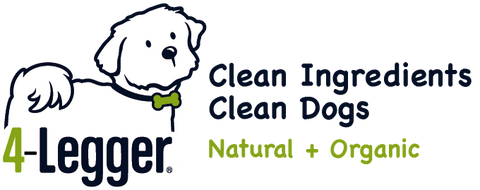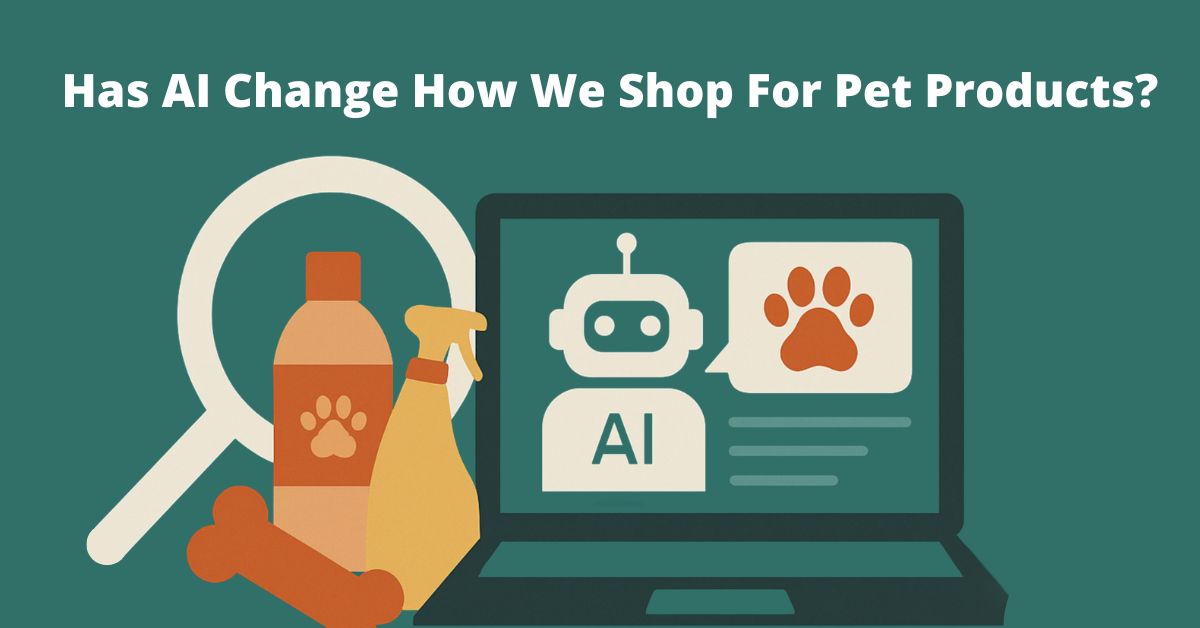Has AI Changed How We Shop for Pet Products?
From personalized playlists to dog shampoo suggestions, AI is everywhere and it's transforming how pet parents discover and buy products.
It has certainly changed how pet parents find 4-Legger Organic Dog Shampoo.
When Google AI took over search results we, like everyone in the pet industry, saw an immediate drop in organic traffic.
What does organic traffic mean?
Organic traffic is pet parents finding you from a "Google search". So, someone may search for "the best organic dog shampoo" and would see 4-Legger at the top of the search results.
Now, instead of seeing the pages that rank first, you see a summary from AI on what they think you want to know condensed into a synopsis.
Whether you're searching for an organic conditioner, a dog flea shampoo, or the perfect chew toy, algorithms are increasingly deciding what you see first.
Tempted to switch off your brain and let AI make every choice for you?
Not so fast!
While artificial intelligence can make pet shopping faster, it also raises important questions about bias, accuracy, and transparency.
AI is not a subject-matter expert. It pulls from blogs, marketing copy, and other content published online.
If you ask an AI tool to recommend a “safe and non-toxic dog shampoo,” it may simply echo what brands or marketers claim — not independently verify which products are truly safest.
Unless you provide high-quality queries and prompt it to evaluate each ingredient carefully, AI won’t perform deep research or toxicology analysis on its own. And even with good inputs, the results can still reflect biases in the sources it was trained on or the data you give it.
If you think sodium lauryl sulfate is a great ingredient, AI will be biased towards it being a safe ingredient.
Here's what pet parents should know before relying on AI-powered recommendations.
How AI Is Influencing Search Results, Ads, and Recommendations
AI is now embedded into nearly every corner of e-commerce:
-
Search engines use machine learning to rank results. Instead of surfacing the most authoritative brand or expert, Google's AI may prioritize pages with the most content or backlinks - even if they're written by generalists or worse, automated tools.
-
Recommendation engines on marketplaces like Amazon or Chewy analyze your past purchases and browsing habits to suggest new products ("AI dog shampoo recommendations" or "pet dental powder you might like").
-
Chatbots and voice assistants answer questions in real time, often pulling from huge databases of articles without ever vetting the source.
This means a search for "best organic dog shampoo" might not lead you to the most knowledgeable brands. Instead, you may land on whoever has the largest volume of articles, not the deepest level of expertise or the actual safest ingredients.
The Risk of "Black Box" Suggestions for Health-Related Products
When AI quietly decides which product shows up first, shoppers can't tell how or why that choice was made. That's especially risky for pet wellness items like:
- Medicated or "all-natural" shampoos
- Supplements and vitamins
- Ear or dental care solutions
- Any product intended to treat or address a health condition
A black-box algorithm may inadvertently recommend products with unverified ingredients, fake reviews, or misleading claims.
Sadly, it is far too easy for an unscrupulous company to generate fake data, fake content, and sell you a product that isn't what it claims to be. It is truly the ultimate in harmful greenwashing methods.
Pets can't tell you if a product isn't working until their skin is dry, itchy, red, and painful - and mistakes can have serious consequences with contaminated ingredients that may cause long term health issues.
What Ethical and Transparent AI Could Look Like for Pet Wellness
A better path forward is ethical AI that values expertise, transparency, and safety.
Why not have an AI platform that the brand could submit products, the ingredients, and it generates unbiased data?
Give users visibility into ranking signals (e.g., ingredient quality, regulatory compliance, independent testing).
Pet parents deserve a system where the safest, most reputable products rise to the top - not just whoever can pump out the most content. It’s something to hope for but it will take a deliberate and concerted effort by conscientious consumers to force such a thing into existence.
Tips for Vetting AI-Curated Pet Products
Until ethical AI is the norm, here are some ways to shop smart:
-
Skip the AI Summary At the top of the Google Search Page.Those quick answers don't always reflect expert knowledge - click through to see who actually wrote the content and whether they are qualified.
-
Look beyond the first page. Visit expert brands' websites directly and compare information. Don’t ever take an AI recommendation without verifying the content. Your dog deserves more initiative than that and they are depending on you to make the best decisions for them.
-
Check for certifications and ingredient transparency. USDA Organic, EcoCert, or cruelty-free seals for example, can signal quality.
-
Read reviews carefully. Favor detailed, balanced reviews over short, overly positive blurbs.
-
For Pet Shampoo, use the Pet Shampoo Ingredient Database. The database reviews each ingredient for purity, safety, if it is natural or synthetic, and if it it could be organic.
-
Support brands with clear values. Companies that take the time and effort to educate pet parents (not just sell to them) often put more care into product safety.
The Bottom Line
AI is reshaping pet shopping, but it's up to us to demand transparency and accuracy.
By combining smart tools with expert-driven brands and evidence-based advice, you can make sure your furry friend gets the safest, most effective products - no matter how clever the algorithm.
Don't let the “garbage in - garbage out” be how you select products that directly impact your furry family's lives! AI can be just that if care isn’t taken to verify information.
You still need to take the time to research products, ingredients, and trust yourself - you are the expert when it comes to your dog's health. Not AI! Don’t ever hand over that responsibility to a machine. Your living, breathing, beloved companion deserves much better than that.





